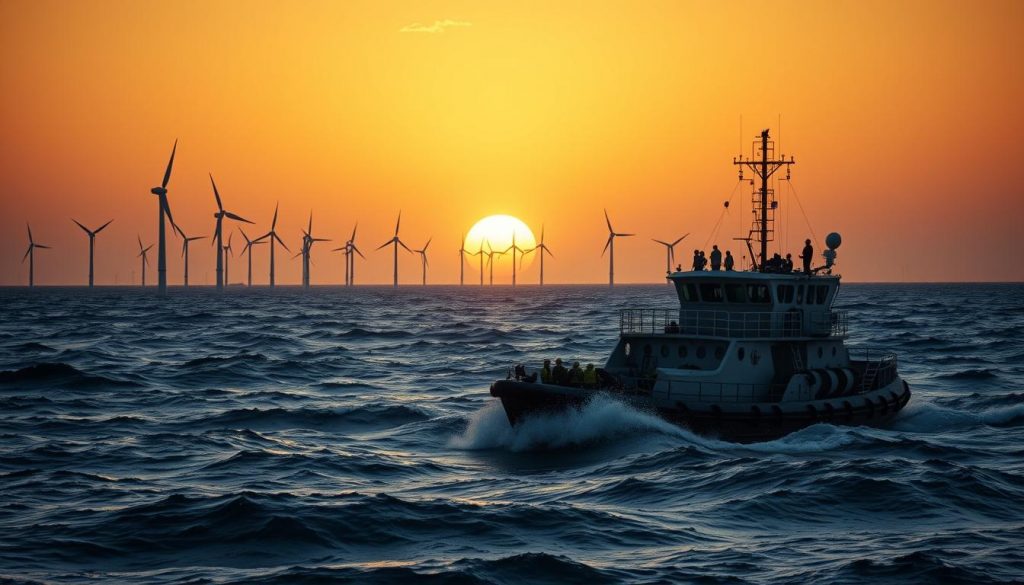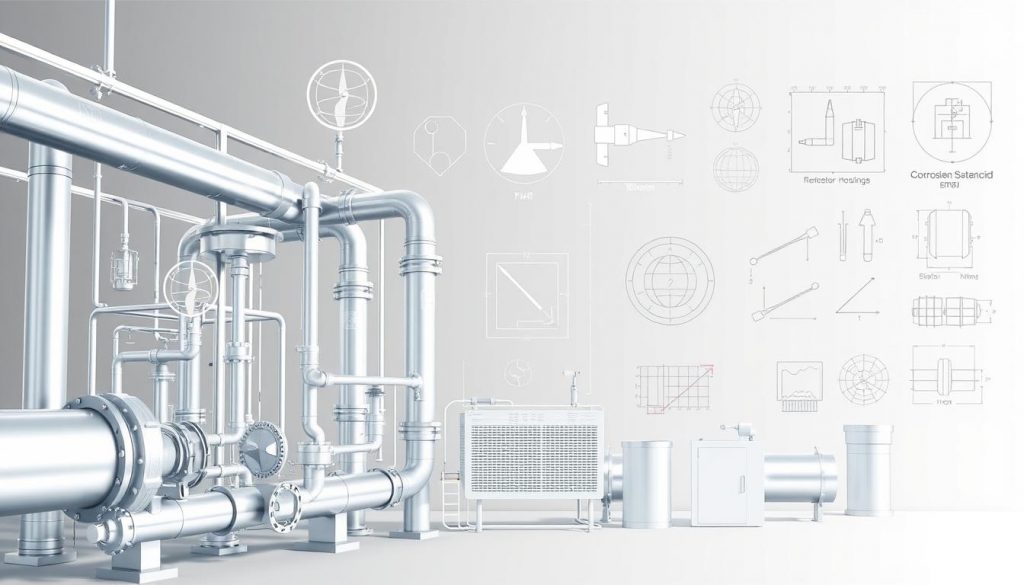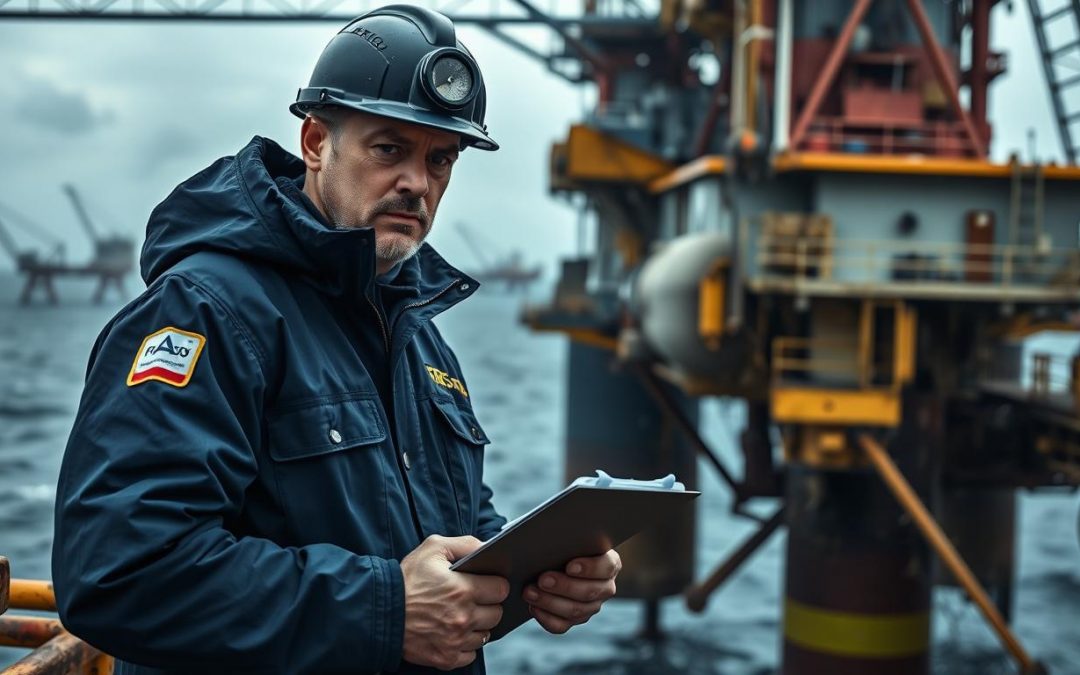The inspection of offshore facilities is a critical aspect to ensure the safety and efficiency of these complex structures. A FROSIO Level 3 Inspector brings comprehensive expertise to the inspection and maintenance of offshore installations.
As a freelance inspector, they offer flexible and specialized services for offshore projects, ranging from inspection to maintenance. Their expertise is crucial for maintaining the integrity of the facilities and minimizing downtime.
Key Takeaways
- A FROSIO Level 3 Inspector is qualified for the inspection and maintenance of offshore facilities.
- Freelance inspectors offer flexible and specialized services.
- Their expertise is crucial for the safety and efficiency of offshore projects.
- Inspection and maintenance are critical to preserving the integrity of the facilities.
- The role of a FROSIO Level 3 Inspector helps to minimize downtime.
The Importance of Quality Assurance in Offshore Projects
The importance of quality assurance in offshore projects cannot be overstated. Quality assurance is crucial to meet the high standards and requirements in offshore projects.
Special Challenges in the Offshore Sector
Offshore projects face special challenges such as extreme weather conditions, complex logistics, and high safety requirements. These challenges require special solutions and careful planning to ensure quality and safety.
Some of the specific challenges include:
- Extreme weather conditions that make the execution of inspections difficult
- Complex logistics that require careful planning
- High safety requirements to prevent accidents
Long-term Impact on Project Costs
Effective quality assurance can reduce long-term project costs by minimizing rework and repairs. By ensuring that all work meets the required standards, expensive rework can be avoided.
| Cost Factor | Without Quality Assurance | With Quality Assurance |
|---|---|---|
| Rework | High | Low |
| Repairs | Frequent | Rare |
| Total Costs | Increased | Reduced |
As the table shows, effective quality assurance can significantly reduce the total costs of a project.
What is a Freelance FROSIO Level 3 Inspector?
A freelance FROSIO Level 3 Inspector is a highly qualified professional for inspections in the offshore sector. These experts are responsible for the execution of complex inspections and ensuring quality in offshore projects.
Definition and Scope of Duties
A FROSIO Level 3 Inspector has comprehensive training and experience in the inspection of surface preparation, coatings, and corrosion protection measures. The scope of duties includes the planning, execution, and documentation of inspections as well as providing recommendations for quality assurance.
Difference from Employed Inspectors
Freelance FROSIO Level 3 inspectors differ from employed inspectors in their flexibility and independence. They can work for various projects and companies, bringing their expertise on a project-specific basis.
Advantages of Self-Employment
Self-employment offers advantages such as flexibility in project choice, independence in work design, and the potential for higher income. Freelance FROSIO Level 3 inspectors can apply their expertise to various offshore projects and continuously develop their skills.
| Characteristic | Freelance Inspector | Employed Inspector |
|---|---|---|
| Flexibility | High | Low |
| Independence | High | Low |
| Income Potential | High | Limited |
The FROSIO Certification in Detail
The FROSIO certification is an internationally recognized quality mark for inspectors in the field of corrosion protection and coating inspection. It ensures that inspectors have the necessary expertise and experience to conduct high-quality inspections.
History and Development of FROSIO
FROSIO, the Norwegian Professional Council for Education and Certification of Inspectors for Surface Treatment, was established to ensure the quality of inspection services. Since its founding, FROSIO has taken a leading role in the industry.
The Three Certification Levels
The FROSIO certification program includes three levels: Level 1, Level 2, and Level 3. Each level represents a different degree of expertise and experience. The Level 3 status is the highest certification level and requires comprehensive knowledge and many years of experience.
Requirements for Level 3 Status
To achieve Level 3 status, candidates must pass a rigorous examination and demonstrate their practical experience. This includes successfully completing an extensive course and submitting documents that prove the required experience.
The FROSIO certification is thus a sign of the highest professional competence and professionalism in the inspection of corrosion protection and coatings.
Qualifications and Competencies of a FROSIO Level 3 Expert
A FROSIO Level 3 expert must possess a combination of technical qualifications, practical experience, and soft skills to successfully manage complex offshore projects.
Technical Qualifications
The technical qualifications for a FROSIO Level 3 expert include a solid education in relevant technical areas, such as corrosion protection and coating technology. These experts must be able to analyze complex technical problems and develop solutions.
Practical Experience
Practical experience is a crucial factor for the competence of a FROSIO Level 3 inspector. These experts must have extensive experience in conducting inspections and applying relevant norms and standards.
Soft Skills and Communication Abilities
In addition to technical and practical requirements, soft skills and communication abilities are also of great importance. FROSIO Level 3 experts must be able to communicate effectively with various stakeholders and convey complex information clearly and precisely.
| Competency | Description |
|---|---|
| Technical Qualifications | Solid education in relevant technical areas |
| Practical Experience | Extensive experience in inspections and application of standards |
| Soft Skills | Effective communication and information dissemination |
Scope of Services of a Freelance FROSIO Level 3 Inspector
A freelance FROSIO Level 3 inspector offers a comprehensive scope of services for offshore projects. This includes various services aimed at ensuring the quality and safety of offshore facilities.
Corrosion Protection Inspections
An important aspect of a FROSIO Level 3 inspector’s work is corrosion protection inspections. These inspections serve to detect corrosion on offshore facilities early and prevent it from causing major damage.
Coating Inspections
Furthermore, FROSIO Level 3 inspectors also conduct coating inspections. These inspections check the quality of the coatings applied for corrosion protection.
Quality Control and Assurance
Quality control and assurance are crucial elements in the scope of services of a FROSIO Level 3 inspector. Regular checks and tests ensure that all offshore facilities meet the required standards.
Consulting Services
In addition to inspections, freelance FROSIO Level 3 inspectors also offer consulting services. They support their clients in implementing quality management systems and solving specific technical problems.
Through this comprehensive scope of services, clients can benefit from the expertise and experience of a freelance FROSIO Level 3 inspector and ensure that their offshore projects are carried out successfully and safely.
Specific Challenges in Offshore Projects
The special conditions of offshore projects require specific approaches to overcome the associated challenges. These projects are particularly demanding due to their complexity and the harsh environment.
Extreme Environmental Conditions
Offshore projects are often exposed to extreme weather conditions, such as storms, high waves, and low temperatures. These conditions can make work difficult and endanger safety.
Logistical Complexity
The execution of offshore projects requires complex logistics, including transportation, accommodation, and supply for the teams. This can lead to challenges in terms of time and cost.

Time and Financial Pressures
Offshore projects are often under great time and financial pressure. Delays can lead to significant additional costs and jeopardize the project’s profitability.
Safety Risks
Working in offshore environments involves special safety risks, including the danger of accidents and exposure to hazardous substances. Comprehensive safety planning is therefore essential.
| Challenge | Description | Measures |
|---|---|---|
| Extreme Environmental Conditions | Storms, high waves, low temperatures | Weather monitoring, robust equipment |
| Logistical Complexity | Transport, accommodation, supply | Logistics planning, efficient processes |
| Time and Financial Pressures | Delays, cost overruns | Project management, budget control |
| Safety Risks | Accidents, exposure to hazardous substances | Safety planning, protective equipment |
The Inspection Process in Practice
An effective inspection process comprises several phases, from preparation to follow-up. This process is crucial for quality assurance in offshore projects.
Preparation and Planning
Preparation and planning are critical steps in the inspection process. This includes reviewing project documents, identifying inspection areas, and defining inspection criteria.
- Review of project documents
- Identification of critical inspection areas
- Definition of inspection criteria and standards
On-site Execution
The execution of the inspection on-site requires careful observation and documentation. Inspectors must pay attention to the specific conditions of the project and record all relevant data.
Documentation and Reporting
After the inspection, detailed documentation and reporting are required. The report should contain all findings, observations, and recommendations.
- Summary of inspection findings
- Documentation of observations and measurement data
- Recommendations for corrective actions
Follow-up and Recommendations
The follow-up of inspection recommendations is an important step to ensure the implementation of the recommended measures. This can be done through regular follow-up inspections.
An effective follow-up ensures that the identified problems are resolved and that future inspections can build on the lessons learned.
The inspection process is thus a continuous improvement process that contributes to long-term quality assurance in offshore projects.
Technical Equipment for Professional Offshore Inspections
Offshore inspections require special technical equipment to ensure the highest quality and safety. The right equipment is crucial for the accuracy and efficiency of the inspections.
Measuring Devices and Their Application
Measuring devices are indispensable for the precise collection of data during offshore inspections. These include thickness gauges for checking material thickness and corrosion meters for assessing corrosion damage.
| Measuring Device | Application |
|---|---|
| Thickness Gauge | Checking material thicknesses |
| Corrosion Meter | Assessing corrosion damage |
Digital Tools and Software
Digital tools and software play an important role in the planning, execution, and documentation of offshore inspections. Inspection management software helps in organizing data and reporting.
Personal Protective Equipment
Personal protective equipment (PPE) is crucial for the safety of the inspector. This includes safety helmets, goggles, and respirators.
In summary, comprehensive technical equipment is essential for professional offshore inspections. It ensures not only the quality of the inspections but also the safety of the inspectors.
International Standards and Norms
In offshore projects, adherence to international norms and standards is essential for ensuring safety and quality. These standards ensure that projects worldwide are carried out to the same high benchmarks.
ISO Standards for Corrosion Protection
An important aspect of international standards in the offshore sector are the ISO standards for corrosion protection. These standards, such as ISO 12944, provide a comprehensive guideline for the protection of steel structures from corrosion. They cover aspects such as surface preparation, the selection of suitable coating materials, and quality assurance during application.

Industry-Specific Guidelines
In addition to ISO standards, there are industry-specific guidelines that have been developed for specific offshore applications. These guidelines take into account the specific challenges and requirements of different industries, such as the oil and gas industry or wind energy.
Regional Differences in Requirements
It is important to note that there are regional differences in the requirements for offshore projects. Local regulations and environmental conditions may require special adaptations of international standards. A freelance FROSIO Level 3 inspector must therefore be familiar not only with international norms but also with regional peculiarities.
Compliance with these standards and norms is crucial for the success of offshore projects. By combining international standards with industry-specific guidelines and regional requirements, high quality and safety can be ensured.
- International standards ensure worldwide comparability.
- ISO standards provide comprehensive guidelines for corrosion protection.
- Industry-specific guidelines consider specific industry requirements.
- Regional differences must be taken into account when applying standards.
Case Studies of Successful Offshore Inspection Projects
Quality assurance through inspections is indispensable for offshore facilities. In this section, we will present some successful projects that were made possible through thorough inspections.
Wind Farms in the North Sea
An example of a successful offshore inspection is the maintenance of a wind farm in the North Sea. Here, corrosion protection problems were identified and resolved early through the use of a freelance FROSIO Level 3 inspector.
The inspection included checking the coatings and identifying areas that required special maintenance.
Oil and Gas Platforms
Oil and gas platforms require special attention due to their complex structures and the harsh environment. A FROSIO Level 3 inspector conducted a comprehensive inspection here, which led to the detection and repair of critical damage.
Marine Research Facilities
Marine research facilities are often deployed in extreme depths and environments. The inspection of such facilities by a FROSIO Level 3 expert helped to ensure the integrity of the structures and increase the safety of the research teams.
Challenges and Solutions
Each of these projects presented unique challenges, from logistical problems to technical difficulties. However, by combining experience and special equipment, these challenges were successfully overcome.
Achieved Results
The results of these inspections were consistently positive. By identifying and resolving problems early, costly repairs were avoided, and the service life of the facilities was extended.
| Project | Challenge | Solution | Result |
|---|---|---|---|
| North Sea Wind Farm | Corrosion protection | Early inspection | Extended service life |
| Oil and Gas Platform | Critical damage | Comprehensive inspection | Safety improvement |
| Marine Research Facility | Extreme conditions | Experience and special equipment | Increased safety |
How to Choose the Right FROSIO Inspector for Your Project
Choosing the right FROSIO inspector is crucial for the success of your offshore project. An experienced inspector can ensure the quality and safety of your project.
Important Selection Criteria
When selecting a FROSIO inspector, you should pay attention to their certification level, practical experience, and soft skills. An inspector with a FROSIO Level 3 certification has comprehensive knowledge in the inspection of corrosion protection and coatings.
| Criterion | Description | Importance |
|---|---|---|
| Certification Level | FROSIO Level 3 | High |
| Practical Experience | At least 5 years of experience in offshore projects | High |
| Soft Skills | Good communication skills | Medium |
Questions for the Initial Interview
In the initial interview, you should ask questions about the inspector’s experience and qualifications. Examples include: “Can you provide examples of your previous inspections?” or “How do you handle challenges on-site?”
Contractual Aspects
When hiring a FROSIO inspector, you should also carefully review the contractual aspects. This includes the scope of work, payment terms, and liability regulations.
Conclusion
The importance of freelance FROSIO Level 3 inspectors for offshore projects cannot be overstated. Through their expertise and independence, they contribute significantly to quality assurance and risk minimization.
In offshore projects, ensuring quality is of utmost importance, as errors or defects can have serious consequences. A FROSIO Level 3 inspector brings the necessary expertise to ensure that all work is carried out in accordance with international standards and norms.
Collaborating with a freelance FROSIO Level 3 inspector offers project operators flexibility and access to specialized knowledge without the need for permanent employment. This makes it possible to address the specific needs of the project while optimizing costs.
Overall, the role of the FROSIO Level 3 inspector in offshore projects is indispensable for ensuring the highest quality and safety. By hiring an experienced inspector, project operators can ensure that their projects are carried out successfully and sustainably.
FAQ
What is a FROSIO Level 3 Inspector?
What qualifications are needed to become a FROSIO Level 3 Inspector?
What are the main tasks of a freelance FROSIO Level 3 Inspector?
How do you choose the right FROSIO inspector for an offshore project?
What role do international standards and norms play in offshore inspections?
What are the advantages of hiring a freelance FROSIO Level 3 Inspector?
How can you ensure the quality of an inspection by a FROSIO Level 3 Inspector?

